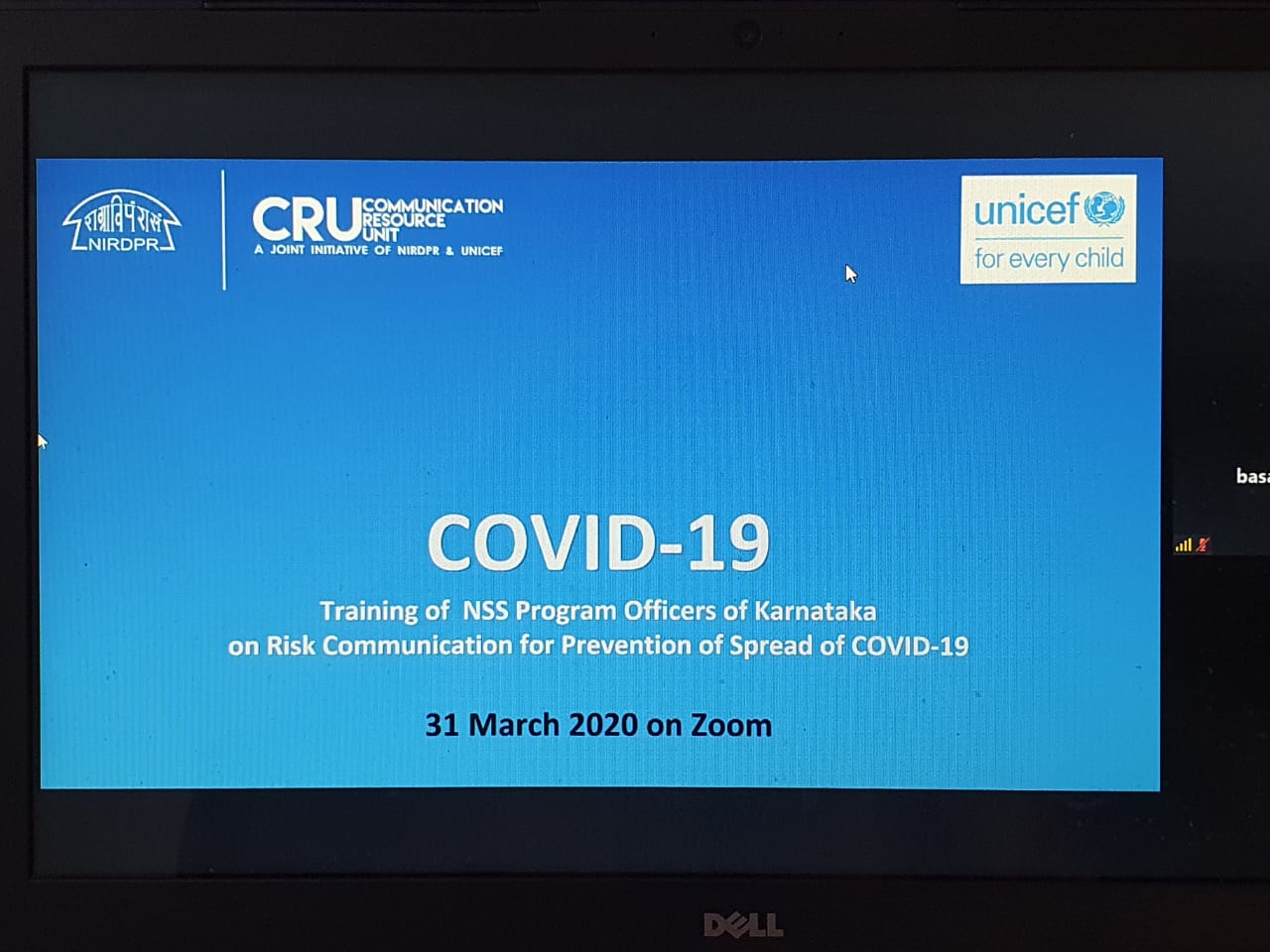NIRDPR & UNICEF train over 28.33 lakh Community Leaders Online on ‘Risk Communication’ to prevent COVID-19 spread
Hyderabad: National Institute of Rural Development and Panchayati Raj (NIRDPR) in collaboration with UNICEF, Hyderabad Field Office, is training over 28.33 lakh Community Leaders through online programs to practice social behaviors required to control the transmission of COVID-19 cases in villages.
NIRDPR’s Communication Resource Unit (CRU) and UNICEF are working closely with the State Governments of Telangana, Andhra Pradesh and Karnataka in preparedness and responses to contain the pandemic.
This initiative, under the leadership of Dr. Gyanmudra, Director, Communication Resource Unit, and Head, Centre for Good Governance and Policy Analysis (CGG&PA), NIRDPR, is a joint collaboration between NIRDPR and UNICEF’s preventive measures and reaches out to key stakeholders in rural communities.
The online training program was initiated along the lines of a detailed Risk Communication Plan to build capacities of Panchayati Raj Institutions (PRI), Self-help Groups (SHG), National Service Scheme (NSS) officials volunteers and Community Radio Stations (CRS) on the role that they can play in preventing the spread of COVID-19 in their groups and village communities.
Speaking about the impact of this initiative, Dr. W.R. Reddy IAS, Director General, NIRDPR, said, “We recognized the exceptional role that Leaders of Panchayati Raj Institutions and village organizations in dealing with the crisis of COVID19 by disseminating reliable information. Hence, we decided to build their capacities by endowing them with facts about COVID19, common symptoms, modes of transmission and key behaviours, among other things.”
The Communication Resource Unit (CRU) of NIRDPR and UNICEF, Hyderabad field office developed and shared relevant materials such as Handouts, Posters, FAQs and Audio-visual documents with all trainees in order to be circulated in their respective rural communities.
Highlighting the response to this initiative, Dr. Gyanmudra, Director, Communication Resource Unit, and Head, Centre for Good Governance and Policy Analysis (CGG&PA), NIRDPR, said, “The response from the States and participants has been very encouraging. The participants are in turn communicating the messages further down to the Panchayat level. In most of the training programmes, which extends to about two hours over video conference calls.”
The programme is being conducted via a digital app for enabling video conference calls with District Master Trainers from Rural Development, Society for Elimination of Rural Poverty (SERP) of Telangana, officials of National Service Scheme (NSS), Health Functionaries of Andhra Pradesh and Community Radio Stations functioning in Telangana, Andhra Pradesh and Karnataka.
Dr. Reddy, who also arranged Training of Trainers (ToT) for faculty members of NIRDPR, added, “States have been directed to organize more online training programmes in COVID-19 management in the coming days so that the pandemic can be contained. We have also planned to rope in Nehru Yuva Kendras to join and help the Panchayat leadership in this effort. The Gram Panchayats, the Local Governments are playing very active role in this effort. NIRDPR is also chronicling the innovative effort of motivated Panchayat leaders and sharing their stories through our online learning platform, gram Swaraj. Leveraging the strength of local governments can alone ensure the pandemic management with less collateral damage revival of the rural economy.”
CRU-NIRDPR and UNICEF personnel coordinate with Heads of various departments and authorities and implement processes such as developing a database of phone numbers and email IDs of district/block level trainees to conduct ‘Training of Trainers’ (ToT) on anxiety management, disseminate basic information on COVID19. They also create awareness on key practices to promote, role of stakeholders. Further, there are also follow ups undertaken on the next level of training to PRIs/Self-help groups (SHG)/Village Organisations (VO) members through digital social media applications.
A total of 28,33,744 key stakeholders from Telangana, Andhra Pradesh and Karnataka have been briefed on the key practices to adopt to prevent the spread of Coronavirus in village communities and groups.
Other key achievements of the programme include:
Ø 873 District Resource Persons (CEO Zilla Parishath, District Panchayat Officers, Mandal Parishath Development Officers, Mandal Parishath Officers and District Training Managers) from the Department of Rural Development of Telangana State were trained in two batches and they in turn trained 55,000 Sarpanches, Secretaries, Zilla Parishad Territorial Constituency (ZPTC), Mandal Praja Parishad (MPP) members covering 4,561 Gram panchayats with the message of COVID19 prevention.
Ø Trained 591 additional District Rural Development Officers (DRDOs), District Project Managers (DPMs), Assistant Project Managers (APMs), District Mission Coordinators, Area Mission Coordinators from Society for Elimination of Rural Poverty (SERP) and Mission for Elimination of Poverty in Municipal Areas (MEPMA) of Telangana in three batches and they in turn covered 541 mandals/blocks and reached 26.11 lakh SHG members with COVID-19 Prevention messages.
Ø Trained 2,528 NSS Project Coordinators/Project Officers of Karnataka, Telangana and Andhra Pradesh as Master Trainers and they in turn cascaded the messages to 6,816 NSS volunteers of Telangana, 2179 NSS volunteers of AP and 1,2040 NSS volunteers of Karnataka.
Ø Trained 34 Lead NGOs of Andhra Pradesh and Telangana states and they covered 30,000 Community members with Covid-19 prevention messages.
Ø 27 Community Radio Stations from three states were trained to broadcast the messages on preventive practices to be adopted to control the spread of virus.
Ø Trained 1963 Health Functionaries of Andhra Pradesh consisting of PHC-Medical Officers and AYUSH Medical Officers, Municipal Health Officers, Panchayati Raj Institutions (PRIs), Women and Child Welfare Department (WCD), Mission for Elimination of Poverty in Municipal Areas (MEPMA) on COVID-19 and they reached 1,10,720 Accredited Social Health Activists (ASHA), ASHA facilitators, Auxiliary Nurse Midwives (ANM) and Anganwadi Teachers.

